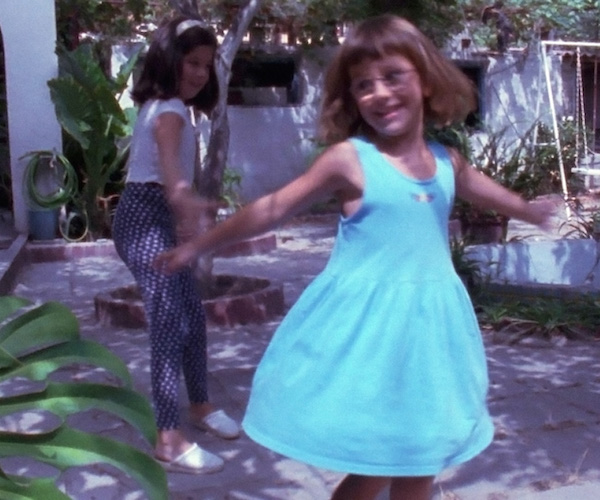Film Review: “Lost in the Bewilderness” — Where Myth and Reality Meet
Filmmaker Alexandra Anthony’s ambitious debut documentary was, in essence, fifty years in the making.
Lost in the Bewilderness, directed by Alexandra Anthony. At the Arlington International Film Festival, Kendall Square Cinema, Cambridge, MA, on October 16 at 2:55 p.m.

A scene from “Lost in the Bewilderness.”
By Paul Dervis
I’m a Greek American, so there are several touchstone moments for me in the masterful documentary Lost in the Bewilderness. But you don’t need to be Greek to find this to be an astoundingly moving film.
Filmmaker Alexandra Anthony’s ambitious debut piece was, in essence, fifty years in the making….and it touches on a plethora of human emotions and existential issues. What is family? How do we cope with inexplicable loss? How can we change our life’s course?
Anthony, a native of Greater Boston, has deep roots in the old country. The relative she is closest to is a cousin in Greece whose older brother married a flight attendant in 1967. They had a precocious little boy named Lucas. The marriage didn’t last, but they managed to co-raise the child with little conflict until 1973. Then one weekend Athena, Lucas’s mother, took him on a trip. Nothing wrong with that.
But they never come back.
The family calls in Interpol. There are reports that the pair have been spotted in Singapore, then San Francisco. But nothing comes of it. Athena is charged, in absentia, of kidnapping, ..a hollow threat considering that mother and child have dropped off the face of the earth.
Life goes on for the family, but with a deep hole in its collective hearts. For years they would celebrate young Lucas’s birthday, his little friends in tow, but without the child himself. His Yia-Yia (grandmother) has packed his toys and clothing away …preserved for the day he will return. A decade passes. His grandfather, terminal with lung cancer, dreams of Lucas days before he passes away. His father, Orestes, has remarried and now has a young daughter, Faye.
Yes. Life, filled with sorrow, goes on.
1983. It is a few days before Lucas’s sixteenth birthday. They hear from Athena. It’s the first time they have had any contact since the woman sent a cruel postcard written in English (a language most of the family does not speak) almost a decade earlier. In that card she claimed that the child does not miss them.
Lucas is now a troubled teenager, running with a bad crowd, and too much for the single mother to handle. They live in Laurel, Maryland, and she is offering him to the clan for the summer. They jump at the chance and the boy arrives in Greece a day before he turns sixteen.
He is shy, and directionless. He likes Ozzie Osborne, heavy metal, and not much else. Orestes, an amateur musician, connects with him on this level, but few others in the family can reach him.
He doesn’t care for Greece much, but his mother has again disappeared, so he stays. He can no longer speak Greek, has no memory of his early years with the family, and appears totally lost in the new environment. The sorrow of his loss has been replaced by the sadness of seeing how uncomfortable the child is in the group.
Flash forward a few years. He has acclimated to his surroundings, but is still awkward. He can speak the language and has made a few friends, but is still a stranger in a strange land. He returns to the United States for college, however, and it seems that there he is finding himself. Like so many of his generation, computers interest him.
Finally, we find Lucas as a man, living in Massachusetts, working in the high tech field, and in love with a Chinese woman. Life has come full circle.
The narrative voice of the piece is the filmmaker, Lucas’s second cousin. Her tones are both haunting as well as comforting. Anthony intersperses the domestic narrative with elements from Greek mythology that are revelatory. We are, at once, watching both a contemporary drama and an age old tragedy. The parallels across time are remarkably compelling…as is this film.
The novice director has managed to take the best elements of the Up Series and infuse it into her own, very personal story. It is a gripping documentary that, though it is very real, has the pulse of a well-crafted drama.
Anthony concludes Lost in the Bewilderness with footage of the family home being torn down to make way for a new apartment complex. She tells us that the ancient Greeks believed that life belonged to the future, not the past. On screen we see two small children playing in the rubble of the old house. The shot strikes a powerful chord in the viewer, as if time itself was dissolving: these contemporary kids could be mirror images of Anthony and her cousins playing around the same sycamore trees so many decades ago. Rarely do films pack such a passionate and resonate payoff.
Paul Dervis has been teaching drama in Canada at Algonquin College as well as the theatre conservatory Ottawa School of Speech & Drama for the past 15 years. Previously he ran theatre companies in Boston, New York, and Montreal. He has directed over 150 stage productions, receiving two dozen awards for his work. Paul has also directed six films, the most recent being 2011’s The Righteous Tithe.
Tagged: Alexandra Anthony, Arlington International Film Festival, documentary, Greek Myth, Greek-American, Lost in the Bewilderness
